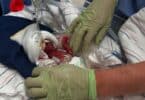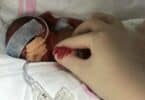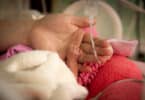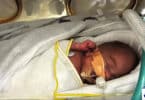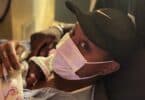November was March of Dimes Prematurity Awareness Month. In honor of this, many parents who have had babies prematurely offered to tell their stories to create awareness about this important cause.
Even though we are into December, we still have many stories to tell. We’d like you to meet Ellis & lanto
On December 29th 2009 at only 24 weeks and 3 days twin brothers Ellis and Ianto were born. At birth, Ellis weighed 1lb 1oz and Ianto weighed 1lb 4oz.
Mom Rachael does not know why she had the boys early – her labour was spontaneous. Her twin’s journey was well documented.
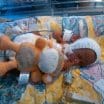
He was put into a plastic bag (they cant be put into towel like normal newborns as they only have one layer of skin), intubated at three minutes of age and was given medication to help strengthen his lungs. Ellis was then transferred to the NICU on the highest pressures the ventilator could go. His oxygen levels did not increase and after numerous x-rays they saw that his lungs were getting very consolidated.
Rachel recalls,
On day 16 he took a real turn for the worse and we were called in the middle of the night at home telling us to get all our family in as Ellis wouldn’t make it through the night.
When doctors did a septic screening and the results showed that he had pulmonary interstitial emphysema (tiny air sacs in lungs), the decision was made to put him on high frequency ventilation.
This was a very scary time for us. To look at our son on this ventilator was heartbreaking. His whole body was vibrating as he received around 720 breaths per minute.
After no improvement another chest x-ray was done and it appeared that he had a left pneumothorax (air within the chest cavity). Doctors then inserted a chest drain and 9mls of air was aspirated by needle. The chest drain stayed in place for four days.
After little improvement a decision was made to give Ellis a course of steriods to help wean him off the high frequency ventilator. He was given hydrocortisone for a course of nine days. On day 24 he was taken off the ventilator and put on SiPAP*.
However, on day 30 he had increasing apnea episodes and doctors discovered a loud heart murmor. He was consequently re-intubated and transferred to Birmingham Children’s hospital for PDA (patent ductus arteriosus- blood vessel that normally closes at birth remains open)ligation surgery on February 10th 2010.
Ellis was again extubated to SiPAP on day 47 and then went onto CPAP (continuous positive airway pressure) three days later. After 2 weeks he was taken off CPAP on put onto nasal prong oxygen. He was on diuretics for the majority of the time in NICU to help his breathing and he even came home on them.
Since birth and for the first three months or so Ellis always had infections and was also fighting fungal infections. He was treated with numerous drugs and needed to have three lumbar punctures while in NICU.
High blood sugars was also a problem for him as well. For the first three days he was fed with TPN (IV) and on day four he was started on expressed breastmilk. His high blood sugars were treated with insulin.
Ellis also suffered with low sodium levels from day 11 and was started on sodium supplements in his feeds that continued for three months after he came home.
After four weeks of being fed milk nurses noticed that he had desaturations (low oxygen levels) while feeding, which lead to a reflux diagnosis. He was treated with domperidone and then went on to having gaviscon in his feeds. Till this day he still has this in his milk.
Like many 24 week babies, Ellis had ROP (retinopathy of prematurity-disease of the retina) and this had developed stage 3 in both eyes. He underwent laser eye treatment in April. Since the treatment he has been closely monitored and there aren’t currently signs of ROP anymore. It is hard to tell at their age whether they will have poor eye sight later on in life.
Ellis also suffered from bilateral inguinal hernias (protrusions of part of the intestine through the muscles of the groin) that were repaired during surgery.
During his time in the NICU he received ten blood transfusions and after a long road, was released home after 4.5 months.
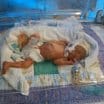
Ianto required the highest pressure of ventilation and when this did not improve a chest x ray was ordered. Results showed pulmonary interstitial emphysema and bilateral consolidation. He was then put onto high frequency ventilation but after five hours his oxygen levels got worse.
Ianto also received diuretics for the majority of the time in NICU and these continued for three months after he got home.
He was extubated onto SiPAP on day 42 and was changed onto CPAP on day 50.
He came off CPAP on day 68 and went onto nasal prong oxygen. However he took a turn for the worse and went back onto CPAP just 3 days later. He came off CPAP again on day 74 and went back onto nasal prong oxygen.
Boys boys were given doses of caffeine to help them remember to breath. This was stopped for both of them on day 100.
Ianto became extremely anemic on the second day and received a blood transfusion – the first of eight during his time in the NICU.
Like Ellis he was treated for various infections from day one of being born and also had three lumbar punctures.
Both boys were given a dose of Synagis when they were 3 weeks old for a possible exposure to RSV (Respiratory syncytial virus). Tests proved, however, that these were negative.
Ianto also had a heart murmor. This was at first treated with indometacin. It appeared to work at first, however he took another turn for the worse and the doctors discovered that it has gotten even bigger. He went to birmingham children’s hospital for PDA ligation on day 37.
Like his brother Ianto also suffers from reflux and is still being treated for it now with gaviscon.
After 5.5 months in the NICU, Ianto joined his brother at home.
In summary the time in NICU was a very emotional, tiring, scary and overwhelming. We have such admiration for all of the staff who have worked to save our sons lives. We owe everything to them and each and every one of them will always be in our thoughts and never forgotten. We gained such great respect for the nurses and we felt totally safe going home at night knowing they were in safe hands.
Quite often when I’d call up before going to bed the nurses would tell me that the boys wanted to tell me they loved me and to have a nice sleep. They really know how to keep your spirits high.
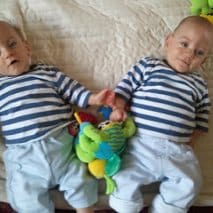
When I first walked into intensive care I really didnt know what to expect. Nothing anyone can say can really prepare you. I was told that my boys would be very tiny and fragile. Never did I picture what I saw. Their heads were smaller than a tennis ball and their hands were the size of my finger nail. They had one layer of skin which meant you could see every vein in their tiny little body. They were just perfect though, they had ten fingers and ten toes.
However one thing which did not develop yet were their ears. They weren’t formed properly and were just tiny little buds.
They couldn’t open their eyes for the first three weeks.
But my God when they did it was the most amazing feeling in the world, seeing your little babies big black eyes staring at you.
It is hard not to be scared when you go into NICU. Seeing all the machines and wires attached to your baby really worries you and the simplest little beep sets your hearts racing thinking that your baby has stopped breathing. Again, the staff are so amazing and taught us what each machine and wire was for and what each noise meant. After a week or so you tend to just block out the noise and concentrate on looking at your babies.
Rachel and her husband had to wait over five weeks to first hold their beautiful little boys. It was the longest time ever for them. What was even harder was only being able to hold Ianto, as his brother Ellis was too ill.
I felt so guilty yet so happy that I held my son, but sad that I couldn’t hold Ellis. It felt as if I was just holding a blanket, he was that light. I was terrified that I was going to pull a wire or a tube out. The cuddle could only last a few minutes as taking them out of the incubator is such as huge thing for such weak babies.
The NICU really does become your second home. Mom and dad spent all day long there and the staff now feels like family.
We grew such great relationships with the other parents too. It helped us being able to talk to people who can truly understand what you are going through.
The boys are now 9 1/2 months old. Ellis weighs 11lb 6oz and Ianto wiehgs 13lb 2oz.
They are doing so well, I could not be more proud. They eat three meals a day and are now starting to have finger foods too. They are almost sitting up and hopefully by their first birthday they will be crawling.
Both boys have chronic lung disease which will always affect them, especially when they’re sick with colds and coughs. At the moment they are too young to know if they will have any learning/development difficulties.
There are no other children in the family but mom and dad hope that in the future there will be.
We have our hands full with the boys at the moment and want to spend all the early years cherishing each day with them.
Sadly, before Ellis and Ianto arrived, Rachel had 3 miscarriages.
My twin boys really are miracles.
I asked Rachel if she had to give one piece of advice to a new preemie parent, what would it be? She said:
Stick with it. Never give up hope. From the moment I was told I was in labour all the consultants/doctors told me my babies would not survive as they would be too weak to even breathe. There was a neonatal nurse in the delivery room with me and she is the one who gave me hope. She told me babies born this early DO survive and mine will fight as hard as they can.
No matter how hard times can be (we have been through many) always be there for your babies.
My husband and I spent all day long with our boys in the NICU. From 9am till 9pm most days. Yes it was exhausting and we were physically drained but we and the nurses truly believe it played a huge part in our boys survival. Yes it will be hard for parents who already have other children at home but just try and find time to show your ill baby that mommy and daddy will always be there.
Last bit of advice is to accept help from friends and family. Whether it is having them do your house work or making you a tea, every little bit helps.
I asked Rachel to describe her boys in one word and she said: MIRACLES
*blows gentle puffs of oxygen into a baby’s lungs, anticipating the baby’s breath and blowing air into its lungs only at the right time. SIPAP ventilators use a sensor which sits on the baby’s abdomen. The abdomen deforms when the baby’s diaphragm descends at the very start of a breath. This causes a minute pressure change, which is detected by the ventilator. A computerised program is then able to work out exactly where a baby is in its breathing cycle and whether it needs to be assisted with an ‘in’ breath or an ‘out’ breath. – Shannon, Staff Writer
- Prematurity Awareness Month ~ Meet Brothers 26 Weeker & Zander & 23 Weeker Quinn
- Prematurity Awareness Month – Meet 27 Weeker Xavier!
- March of Dimes Foundation Hosts 5th Annual Celebration of Babies Luncheon
- Prematurity Awareness Month – Meet 24 Weeker Brielle Lynn!

